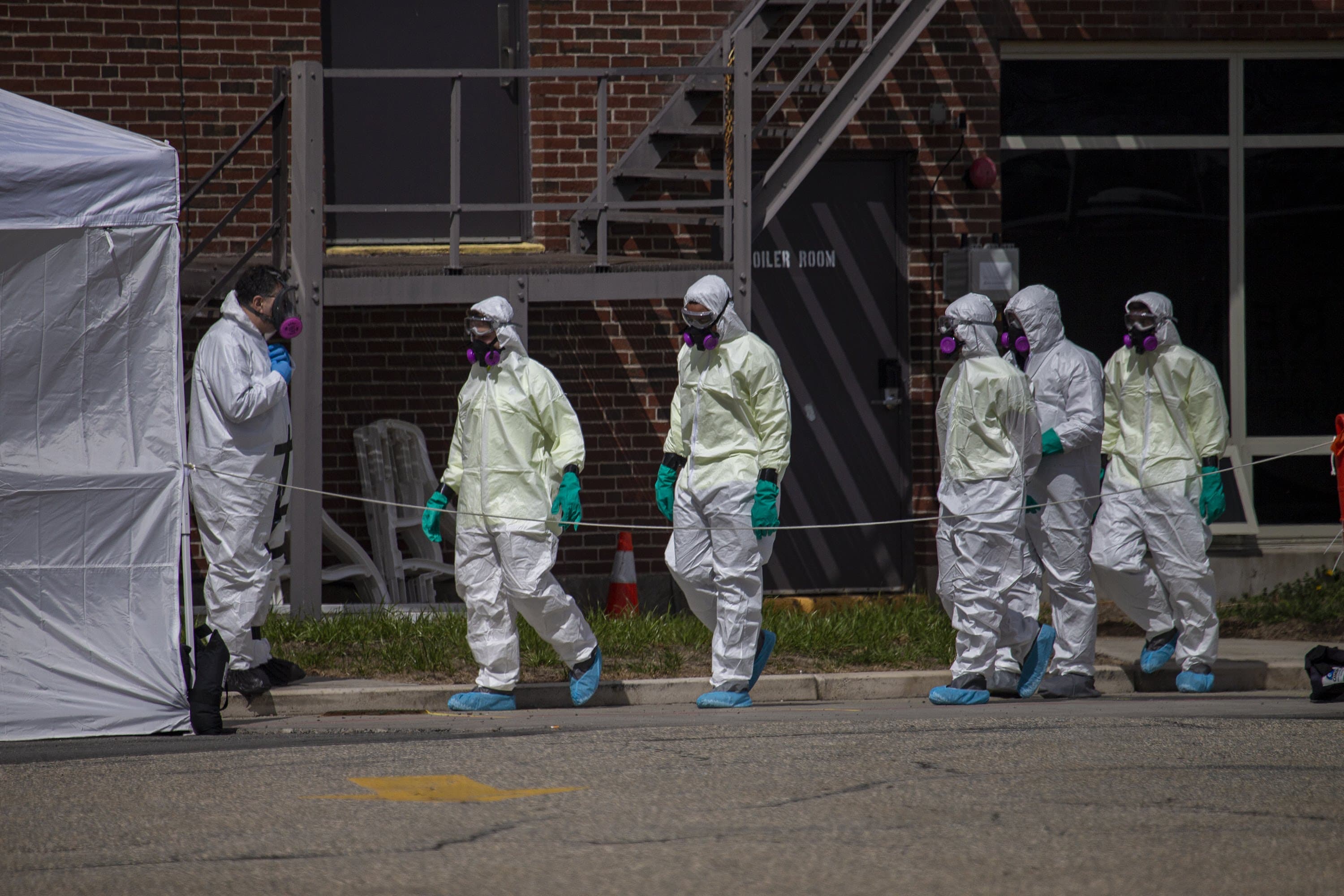
As COVID-19 Killed Veterans, Holyoke Soldiers' Home Staffers Say Leadership Botched Response
To keep its veterans safe as the coronavirus swept across the U.S., the Soldiers' Home in Holyoke started making big changes in mid-March. Like many other long-term care centers for seniors, the state-run facility focused on disinfecting surfaces and restricting outside visitors. It also started screening staff for symptoms.
But its efforts to prevent infection didn’t work; in mid-March, an elderly man in the memory care unit began showing symptoms consistent with COVID-19.
Since then, many more have fallen ill. At least 18 veterans have died, 12 of whom have tested positive for the coronavirus so far.
The story exploded into the public consciousness on Monday, drawing outrage from local officials and countless others. The superintendent of the facility was put on paid administrative leave, and the National Guard was brought in to test all residents and staff.
The deaths prompted questions, too. And on Wednesday, Gov. Charlie Baker ordered an independent investigation into what did — and did not — happen. But it could be some time before the investigator sorts out the facts.
WBUR spoke with employees about their experiences over the last few weeks to piece together a clearer timeline. Their descriptions tell a damning story of poor decision-making by leaders at the facility — decisions that likely contributed to the spread of the virus among residents and staff.
The following account is based on interviews with three employees of the Soldiers’ Home in Holyoke and two union representatives who spoke with dozens of other employees, as well as private documents and email correspondence.
Two of the three employees agreed to speak on the condition of anonymity because they’re worried about losing their jobs. One of them is a certified nursing assistant (CNA); the second is a licensed practical nurse (LPN). Both say they have worked at the Soldiers’ Home for more than a decade.
The third employee, Joseph Ramirez, is a CNA in the memory loss unit and vice chair of the SEIU Local 888 Chapter, the union that represents many Soldiers’ Home employees.
WBUR reached out to Health and Human Services, as well as the state’s Department of Veteran Services and the Holyoke Soldiers’ Home, and was directed to previous public statements.
Patient Zero
It’s unclear how the first veteran contracted the coronavirus, but what is clear is that some staff at the Soldiers’ Home were aware that a resident on one floor of the memory care unit had symptoms consistent with COVID-19. One of those workers was the CNA we agreed not to identify. He says he’d been told about the sick resident before his shift on March 16, and then saw it firsthand when he got to work.
“He was coughing a lot and was very weak,” the CNA says.
The CNA says he also learned from another employee on duty that the resident had been tested for the coronavirus, but results hadn't come back yet.
"I read the CDC guidelines," he says, referring to the U.S. Centers for Disease Control and Prevention. "When somebody is [suspected of having the virus], immediately that person needs to be isolated."
But according to two employees with firsthand knowledge, that didn't happen.
"He was not in any sort of isolation," the CNA explains. "He was among 23 or 24 other veterans. He walked around infecting everyone there."
It is difficult to isolate someone with dementia or Alzheimer's disease, especially those who tend to wander, but the CNA thinks leadership at the Soldiers’ Home should have directed staff to make more of an effort to keep the sick man away from others. And, at a minimum, he thinks they should have told everyone in the building about the man's condition so they could take precautions.
“In the meantime, this veteran was still in the main area where all the other veterans hang out, and the CNAs and nurses continued to do their daily care that they needed to do on this veteran,” Ramirez, the CNA and union vice chair, says. “When they finally decided to test him … nothing was done in the interim while we were waiting for results. Staff was not told [to] wear a mask, or to be careful when you’re doing care around him. It was still just basic: ‘Wash your hands, wash your hands, wash your hands.' ”
The results came back positive. And according to the CNA who wished to remain anonymous, the news spread among staff before the official word came down.
“They tried to not let most of the staff know, but most of the nurses found out,” he says. “This cover up nonsense; they need to stop it. Cover up, cover up, deny, deny — that’s why we are where we are now.”
Ramirez says he believes all staff who had contact with the sick man should have been told to self-quarantine at home for 14 days.
“But that did not happen,” he says. “That’s when the snowball effect [started] and everything went downhill.”
An email provided to WBUR dated March 17 shows that SEIU 888 union organizer Cory Bombredi asked the facility's management about what they were doing to ensure the safety of workers and their families after employees “reached out to me for assistance.” According to Bombredi, no one from management responded.
“They tried to not let most of the staff know, but most of the nurses found out. This cover up nonsense; they need to stop it. Cover up, cover up, deny, deny -- that’s why we are where we are now.”
On March 22 — about a full week after the CNA says he noticed the resident showing symptoms — the Soldiers’ Home went public with the fact that a resident had tested positive. Bombredi said this was also the day staff were informed of the positive test. Like other news outlets, WBUR reported what a Department of Veteran Services spokesman said: that the man was in isolation and that all employees who cared for him were taking proper precautions and wearing personal protective equipment.
The CNA and Ramirez say none of that happened. The infected man’s roommates were moved to another room, but they say the sick resident was still able to interact with other residents in common spaces. A timeline made by the workers’ union also states that members reported “the Veteran was still free to walk around the unit, risking the spread of the infection.”
What’s more, all three employees we spoke with said there weren't enough N95 masks and protective gowns, and that available gear was distributed unevenly.
“We had basic stuff: gloves, masks — but they were just thin yellow ones,” Ramirez says. He adds that staff on the floor with the infected man asked for gowns but they were told those weren’t necessary unless they were dealing with the person who tested positive.
The LPN who spoke with WBUR on the condition of anonymity says the normal stock of masks and other protective supplies had been removed from her unit.
“[Management] said that because of the shortage coming, we didn't need them. And if somebody needed them, they would have to go to management to get a mask,” she says.
The CNA also provided WBUR with a copy of a letter he received on March 20 admonishing him for wearing “Personal Protective Equipment without permission or need.” The CNA says he wore the extra gear because he was working on a floor where some residents — in addition to coughing — had diarrhea and were vomiting from what he assumed was a gastrointestinal bug.
“I’ve been working there for almost 20 years, [wearing this gear] is facility protocol for infection containment,” he says.
But in the letter, the CNA was told his “actions are disruptive, extremely inappropriate and have caused unnecessary resources to be deployed that may be needed in the future.”
'I Just Can't Handle This'
Meanwhile, the situation inside the Soldiers’ Home was getting worse. Both residents and staff began falling ill. Multiple employees were calling in sick every day.
The facility was already “chronically understaffed,” according to the union. All three employees told WBUR they were shocked by what they say management did next. Instead of requesting outside assistance, management decided to consolidate residents so that fewer staff could attend to more people.
The employees told WBUR that two floors of memory care patients, including the first man who tested positive, were combined. Some rooms meant for two residents were suddenly “crammed” with three or four people, and beds were moved into a dining area.
“They should have been getting ready to isolate people,” Ramirez says. “Instead, what they did was condense people.”
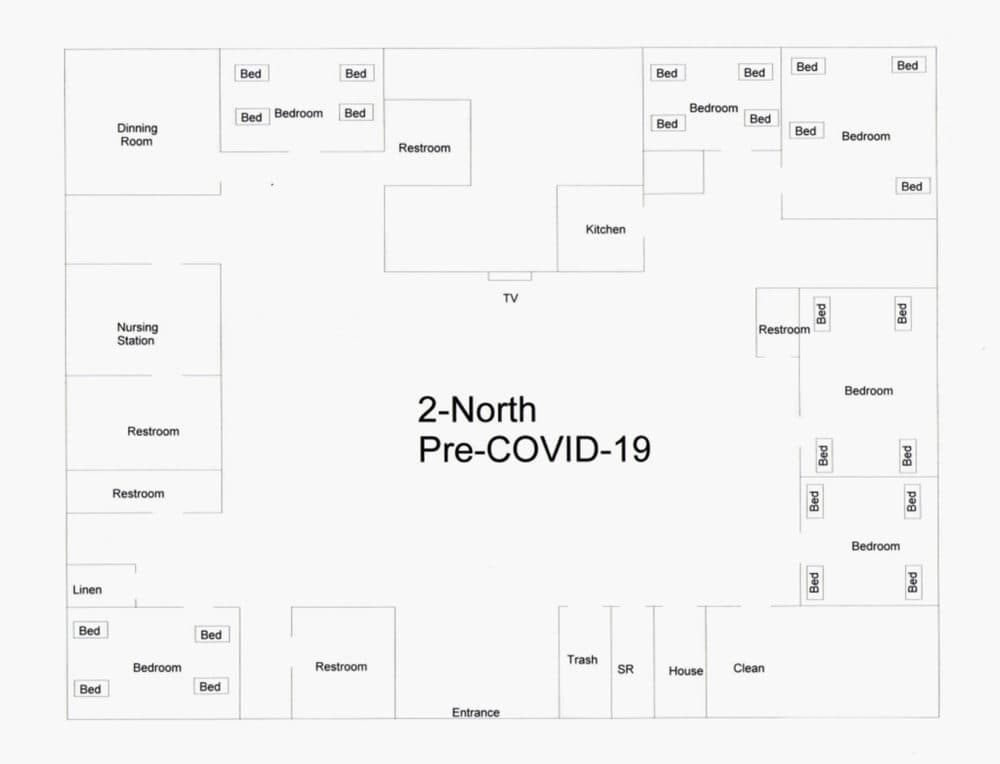
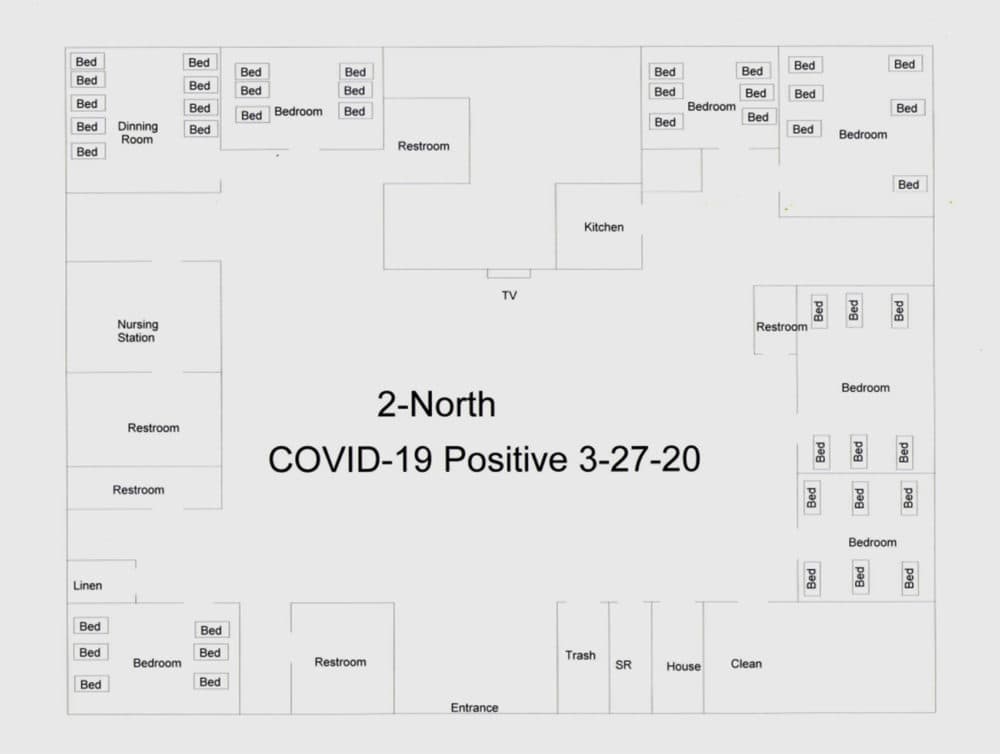
“It doesn’t make any sense,” the CNA says. “For a veteran who has laid down their life for this country — you cram them in one unit and say we don’t have enough staff. … What do you think is going to happen? Those who were negative are going to become positive.”
And soon, there were more positive cases. An internal all-staff email went out on Friday, March 27 — five days after the facility went public with one case of COVID-19 and two days before state and Holyoke officials say they knew more than one person was infected. The email said: “Today, the Soldiers’ Home has had eight residents test positive for COVID-19, bringing the Home to a total case count of nine residents and one employee.”
Ramirez was home sick with flu-like symptoms and a cough by then, but he says he spoke on the phone with other employees who were still going to work.
“I got phone calls from my coworkers who were crying. They were overwhelmed,” he says. He recalls a particular phone call he got from a young nurse on the night of March 27. According to Ramirez, she told him she had to help put three dead veterans into body bags that day, and said through tears:
“I don't know how to deal with this. I just can't handle this.”
Ramirez says other employees told him people were afraid to stay home when they weren’t feeling well, or told they wouldn’t be paid if they called in sick.
Meanwhile, other employees at the Soldiers’ Home were desperate for outside help. Some called the union, which continued to press management for answers about workers’ concerns and personal safety. Others reached out to media and Holyoke Mayor Alex Morse anonymously.
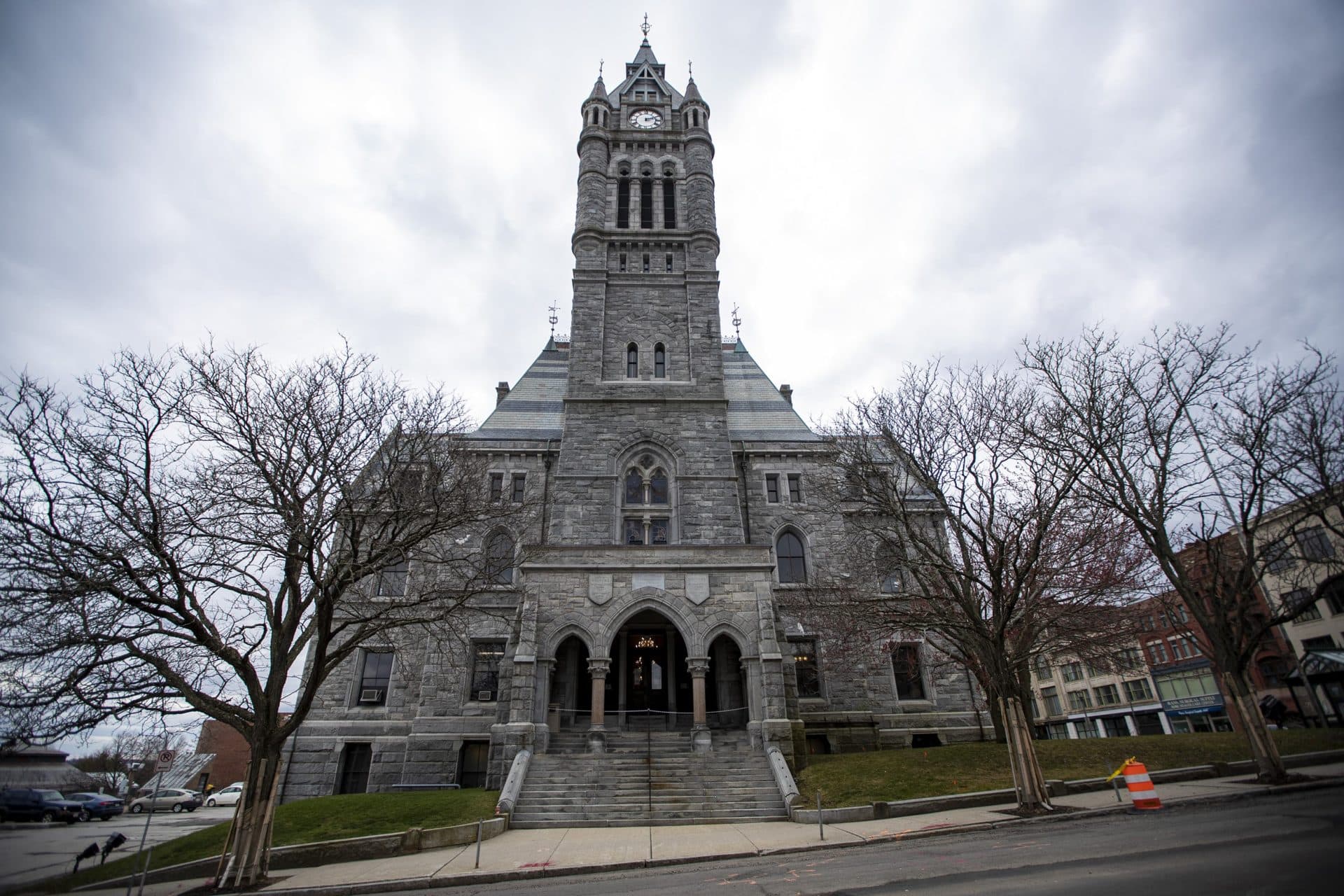
Morse says his office began receiving tips about a rapidly deteriorating situation at the home on the night of Friday, March 27th, and that he called Soldiers’ Home Superintendent Bennett Walsh the following day. It was during that phone call he learned the true extent of the problem: that eight residents had died since Wednesday and many more were sick.
“My takeaway from that conversation was that they hadn't taken the adequate precautions," Morse told WBUR. "And to be honest, there was little sense of urgency on that call. We were told by [Superintendent Walsh], 'Well, all of these folks had underlying health conditions.' And that answer just wasn't good enough, so I got off that call and I reached out to the lieutenant governor [Karyn Polito]. She got back to me right away and said, 'We're on it.' "
Also on Saturday, SEIU Local 888 President Brenda Rodrigues emailed and called Health and Human Service Secretary Marylou Sudders after hearing from employees that “there had been multiple deaths in the home.”
“She did call me back Saturday night and said that there had just been one death at the facility,” says Rodrigues. “I instructed her that that was not the case … I think she was taking [Superintendent Walsh’s] word against what I was saying to her.”
Sudders did not respond to a request for comment in time for publication.
At a press conference Tuesday, Gov. Charlie Baker said both he and Sudders learned about the magnitude of the problem on Sunday.
More Deaths, But More Oversight Now
By noon on Monday, a command center under the leadership of Western Massachusetts Hospital CEO Val Liptak had been set up at the Soldiers’ Home to stabilize the situation. Superintendent Walsh was placed on paid administrative leave, and Cheryl Poppe, who runs the Soldiers’ Home in Chelsea, was made acting superintendent. (Walsh maintains he and his staff did not “conceal or mislead anyone regarding the tragic impact of the virus.")
Hours later, the state reported 11 veterans were dead, five of whom were confirmed to have COVID-19. By Thursday morning, the number of dead had risen to 18 — all veterans who had lived there. At least 23 other residents and seven staff members have tested positive for COVID-19, too.
"Yesterday, we had to bag bodies. Today, I saw people that are on their way to death. This is not a third world country, this is the United States of America. … I’m so angry."
According to the Executive Office of Health and Human Services, all residents have been tested for the coronavirus, and progress is underway to test all staff. HHS also says the state is creating isolation and quarantine zones at the home, but according to the CNA, some residents are still cohabiting in rooms. He adds there are eight or nine veterans sleeping in the dining room with no curtains or privacy.
When asked about the current living arrangements for the veterans, spokespeople from the Soldiers’ Home and the Department of Veterans Services did not respond.
“Yesterday, we had to bag bodies. Today, I saw people that are on their way to death,” the CNA told WBUR on Wednesday. “This is not a third world country, this is the United States of America. … I’m so angry.”
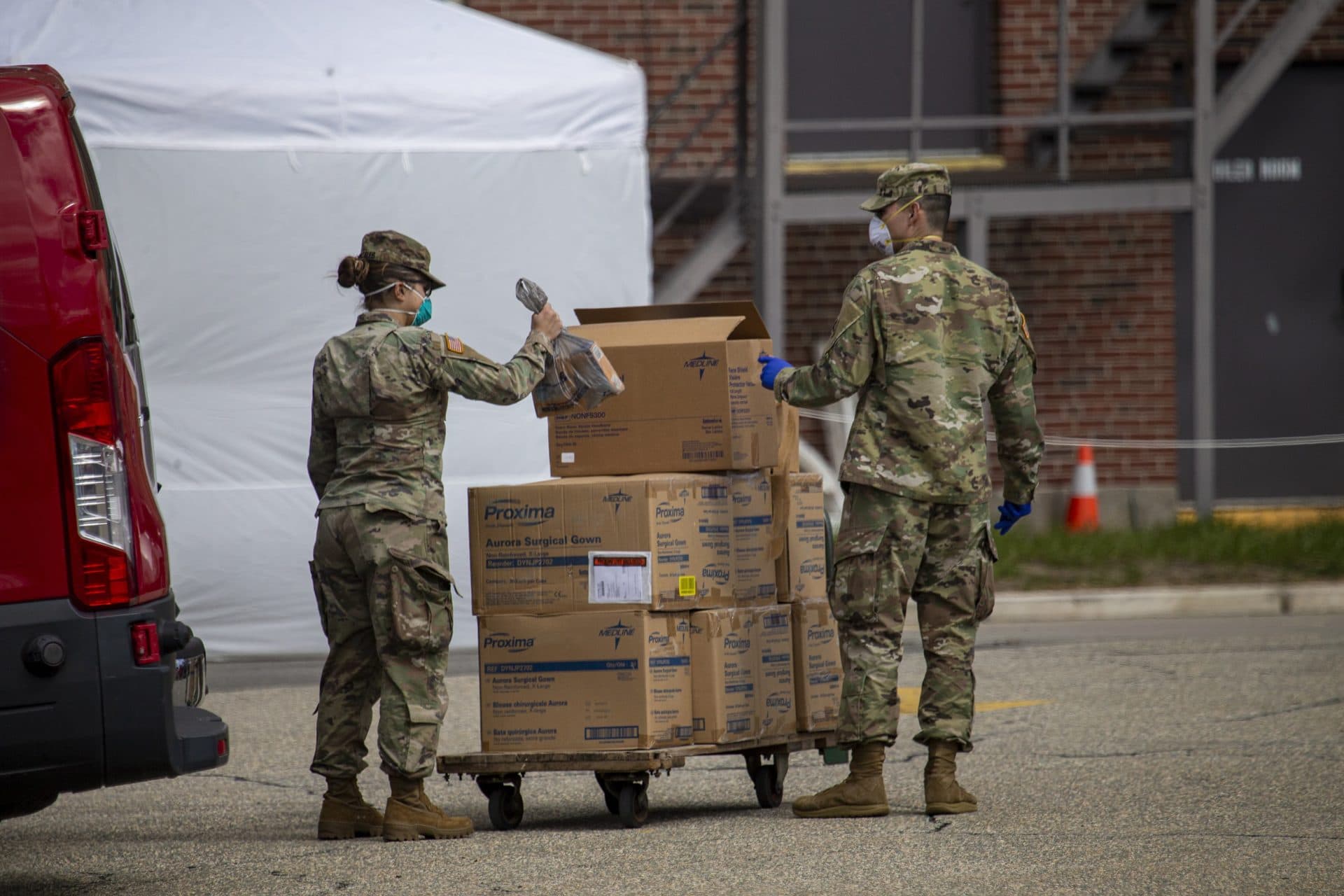
The LPN, who did a shift at the Soldiers’ Home Wednesday, says she worked in a different unit that day and is not sure whether residents are still cohabitating. But, she adds, the situation at the home overall has improved since the governor called in the National Guard and HHS established a command center on site.
“It’s just a whole totally different atmosphere. Yes, it's much improved,” she says.
And while she’s grateful her “prayers were answered,” and that the state stepped in, she’s furious that management spent so many days telling staff that everything was under control instead of pulling in extra help and supplies.
“Many veterans have suffered," she says, "and many more will continue to suffer [because] they have been exposed."
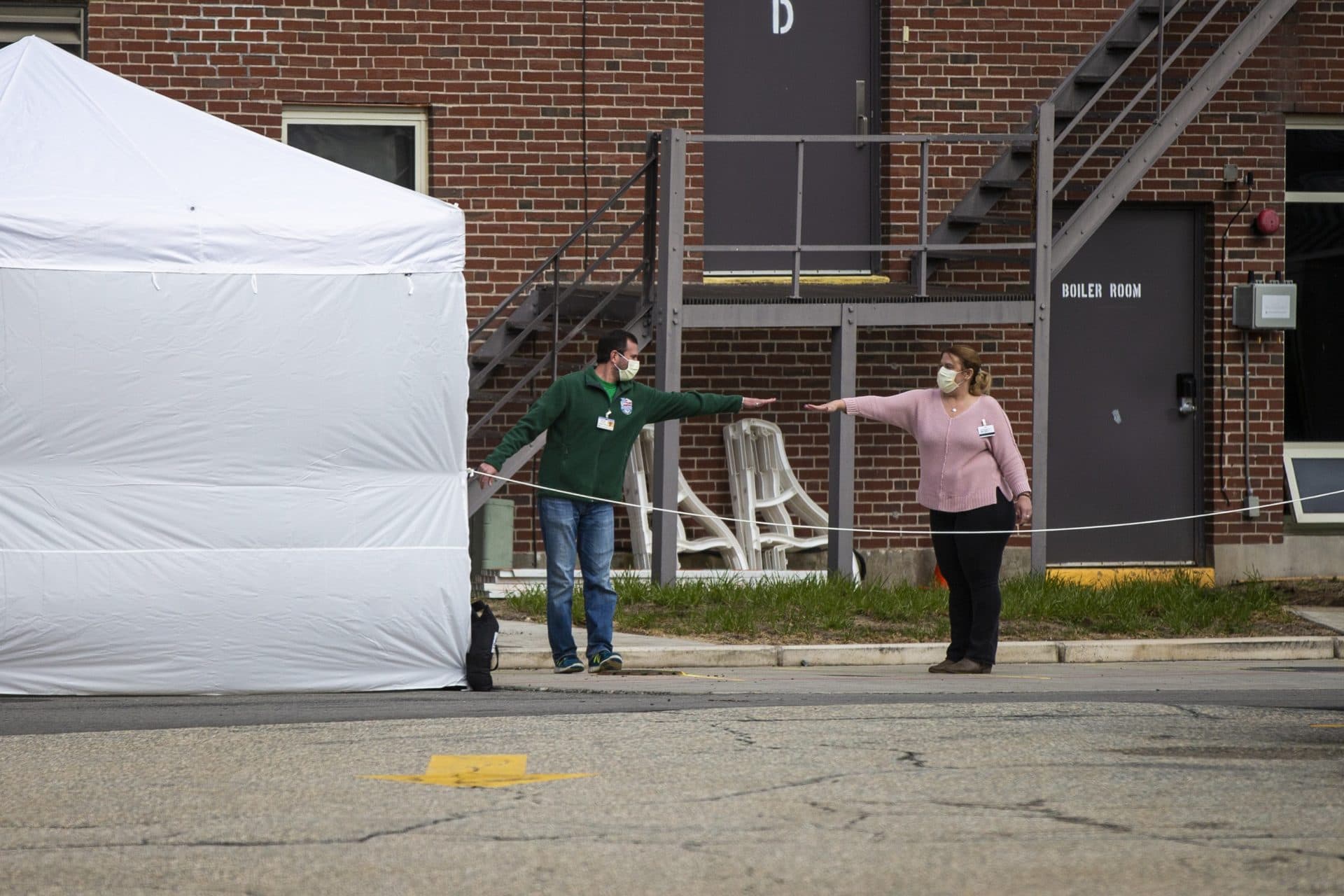
This article was originally published on April 02, 2020.
This segment aired on April 2, 2020.
